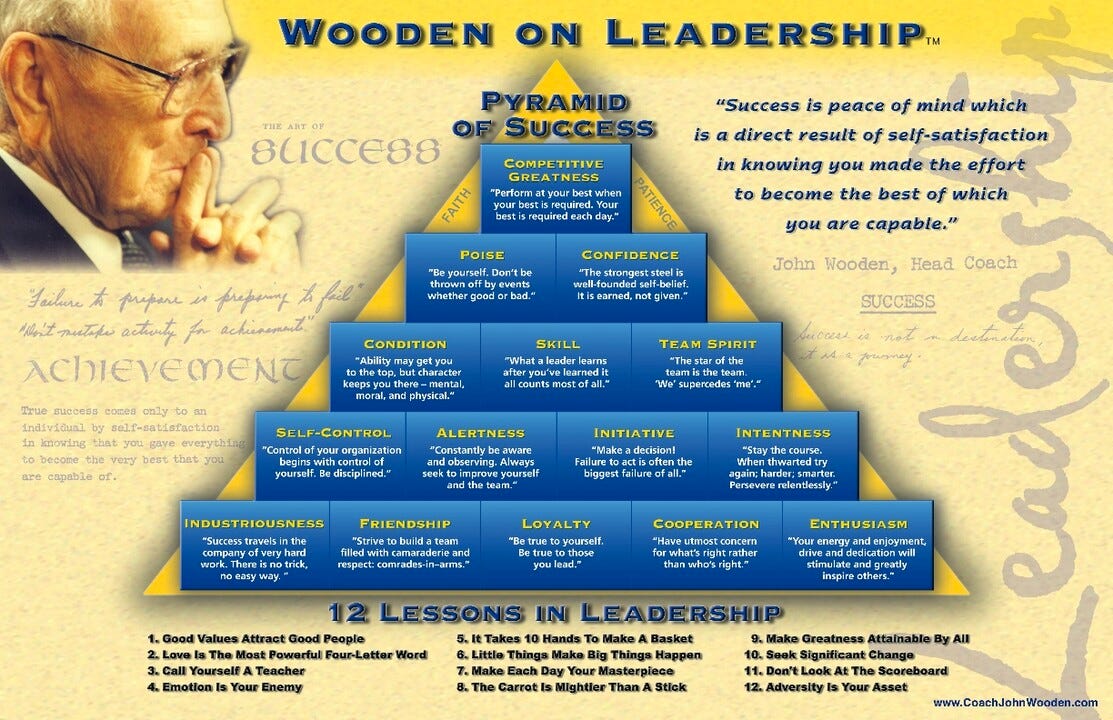Lead like Coach K or Coach Knight

For those unaware, both the Women’s and Men’s NCAA Basketball Tournaments ( March Madness) are underway. Each tournament brings together the 68 best teams from across the country. Even folks who might not usually pay attention to college sports may tune in to root for an underdog or fill out a tournament bracket prediction. In fact, upwards of a 100 million people fill out a bracket each year. No one is believed to have ever completed a perfect bracket, given the dizzying odds of correctly predicting every game in the tournament—approximately 1 in 9,223,372,036,854,775,808, or 1 in 9.2 quintillion (assuming purely random guesses).
Of course, not every team is created equally. There are over 300 schools in Division I men's basketball. Yet, only 15 programs have won multiple championships. The winningest coach in the men’s tournament was John Wooden, who led UCLA to 10 championships. His coaching philosophy extended beyond basketball with his writings influencing leaders from many fields. Two of my favorite quotes from Wooden include “A coach is someone who can give correction without causing resentment” and “The most powerful leadership tool you have is your own personal example”. Wooden’s Pyramid of Success emphasizes the need to work on oneself before cascading upwards to team success.
In men’s basketball, beyond Wooden, two of the most well known coaches are Mike Krzyzewski, better known as Coach K, of Duke University, and "Bobby" Knight of both Indiana and Texas Tech. Both coaches had over 900 wins during their careers. Coach K won led his team to five national titles while Coach Knight led 3 national title teams. Both coaches also won gold medals as coaches for U.S. Men’s Olympic team.
The professional accolades and win-loss records are where the similarities end. Coach K was beloved by his players, staff, and community. Coach K was very player-orientated, including strong recruiting and development of his players. In 2022, Coach K was also the recipient of the 2022 Heisman Humanitarian Award. The award was for his work off the court for his work with the Emily K Center (named for his mother), which provides academic support to 2,000 K-12 students annually in the Durham, N.C. area.
Despite all of his success court-side, Coach Knight is perhaps best known for his temper. He frequently yelled at his players, was combative in media interviews, and threw objects (including a now infamous incident throwing a chair across the court during a game). In 1997, which only surfaced in 2000, Coach Knight choked a player in front of other players and staff. Video eventually surfaced of the incident as well. Despite all of this, Coach Knight was only placed on probation by Indiana with a "zero-tolerance" policy going forward. Coach Knight was then fired a few months later when he grabbed another player. Although the incidents followed him for the rest of his life, he still managed to land a job as the head coach at Texas Tech and then as a commentator for ESPN.
Despite their wildly different approaches to leadership, both Coach K and Coach Knight won a lot of basketball games. However, their legacies are vastly different. Coach Knight produced around two dozen NBA players whereas Coach K built a pipeline for over 50 players to the professional level. The trend was similar for assistant coaches that trained under each. Ironically, Coach K actually played under Coach Knight at West Point (Army) in the late 1960s and it was Coach Knight that would eventually recommend Coach K take over as the Army head coach. Coach K often spoke about his respect and gratitude for Coach Knight, but distanced himself after the 2000 incident.
What describes the differences in success of their mentees between the two coaches? I think Coach K fits the mold of other servant leaders, a leadership philosophy where the primary goal of the leader is to serve others—rather than accumulating power or control. As Simon Sinek notes, “leadership is not about being in charge. It's about taking care of those in our charge”.
If we step back a bit and think about leadership, I think Coach K fits Jim Collins’ idea of a Level 5 leader. In his book, Good to Great, Jim Collins noted that Level 5 leaders are the rare executives that achieve greatness by articulating a clear vision and also maintaining personal humility. In contrast, Level 4 leaders can have enormous professional success in lead teams or organizations. Yet, these leaders may often more focused on their own success as opposed to their mentees and the health of the overall organization. As I noted earlier, Coach K was played-orientated and focused on their development, which ultimately led to team success. Coach Knight took the perspective of a leader at the top of their organization where everyone below him were their to help make him and the organization successful. I think Coach K was there to serve others, not himself.
As a lab leader, where do you look for inspiration outside of academia? What type of legacy do you want to leave—not just in results, but in people?




